8 releases
| 0.3.1 | Dec 24, 2024 |
|---|---|
| 0.3.0 | Dec 10, 2024 |
| 0.2.4 | Nov 23, 2024 |
| 0.1.0 | Aug 21, 2024 |
#208 in Programming languages
1.5MB
4.5K
SLoC

qalam
Roman urdu inspired, interpreted programming language written in Rust.
Try out Qalam in the playground
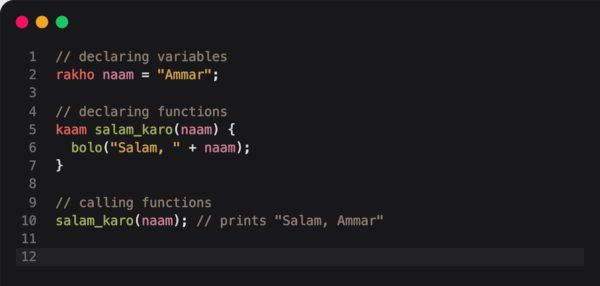
Table of Contents
Introduction
As a learning exercise, to really hone my skills, I wanted to write a programming language myself. In order to accomplish this, I'm following the amazing tutorial called Crafting Interpreters by Robert Nystrom.
While Robert goes through the entire process, step-by-step, to create a programming language he calls Lox, I didn't want to simply follow a tutorial and copy-paste code. I have found that real learning occurs when you change up tutorials a little so that you can have a deeper understanding.
In order to do this, I decided to create my own syntax for the language with the same general features as Lox. I also decided to use Rust to make the language instead of Java so that I cannot possibly copy-paste code.
[!NOTE] Some of you who have been here before remember that Qalam was very different before. It was "Islamic/Arabic terminology inspired". I decided to change the syntax because this project is more of learning exercise/joke than a real-world or useful product. For this reason, I thought that it's not very appropriate to use Islamically inspired syntax for something that is a joke.
All of this worked out because Qalam actually means the same thing in both Urdu and Arabic, pen.
Using qalam
- Install the
qalaminterpreter
cargo install qalam
- Create a
.qlmfile with your source code
echo "bolo \"sab ko salam!\"" > main.qlm
- Run the
qalamcode
qalam main.qlm
>> hello world!
Syntax
Keywords
| Syntax | Meaning/Inspiration | Usage |
|---|---|---|
rakho |
To put/place. Values are placed into the variable. | Variable declarations |
kaam |
Work/Job/Action. Functions do things (actions/jobs) | Function declarations |
wapis |
To return | Return statement |
bolo |
To say | Print statement |
khali |
Empty. Signifies a value is not present | Null value |
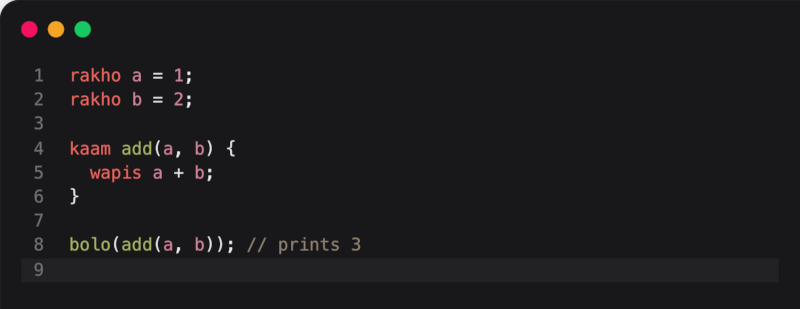
Code
rakho a = 1;
rakho b = 2;
kaam add(a, b) {
wapis a + b;
}
bolo(add(a, b));
// prints 3
Conditionals
| Syntax | Meaning/Inspiration | Usage |
|---|---|---|
agar |
If. Self-explanatory | If statement |
warna |
Else. Self-explanatory | Else statement |
sach |
Truth. A boolean true indicates truth. |
Boolean true value |
jhoot |
Lie. A boolean false indicates falsehood, lies, etc. |
Boolean false value |
aur |
And. Self-explanatory. | And operator. Can also use && |
ya |
Or. Self-explanatory. | Or operator. Can also use || |
na |
Not. Self-explanatory. | Not operator. Can also use ! |
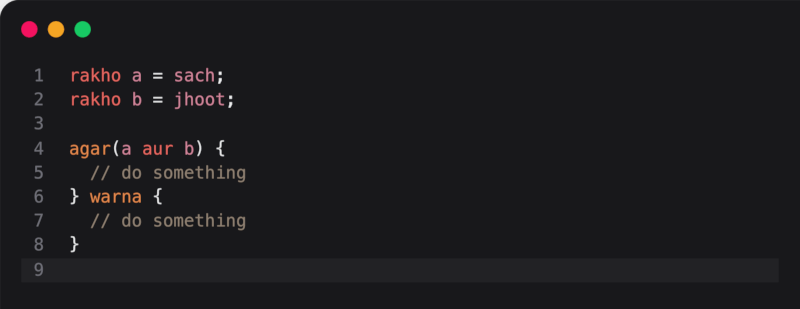
Code
rakho a = sach;
rakho b = jhoot;
agar(a aur b) {
// do something
} warna {
// do something
}
Loops
| Syntax | Meaning/Inspiration | Usage |
|---|---|---|
har |
Every. Does something for every value that passes the condition. | For loop |
jabtak |
While/As long as. Self-explanatory | While loop |
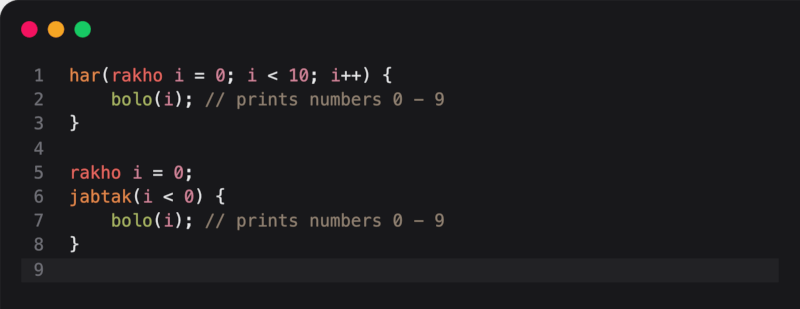
Code
har(rakho i = 0; i < 10; i++) {
bolo(i); // prints numbers 0 - 9
}
rakho i = 0;
jabtak(i < 0) {
bolo(i); // prints numbers 0 - 9
}
Objects (Classes)
| Syntax | Meaning/Inspiration | Usage |
|---|---|---|
jamat |
Group/Class. Self-explanatory. | Class definition |
banao |
To make/build. The constructor makes the class object. | Class constructor function |
yeh |
This. Self-explanatory | Instance accessor (this in JavaScript, self in Python/Rust) |
asli |
Original. The superclass is the original (parent) of the class. | Superclass accessor (super in JavaScript) |
shamil |
Include. The base class includes the functionality of the superclass. | Class inheritance operator |
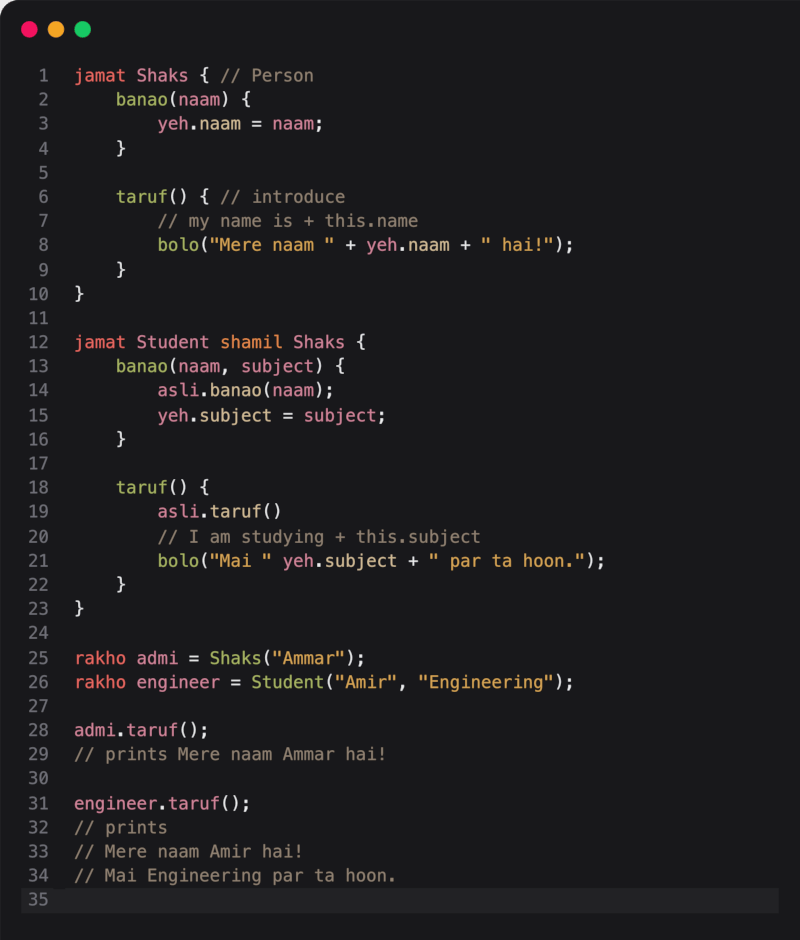
Code
jamat Shaks { // Person
banao(naam) {
yeh.naam = naam;
}
taruf() { // introduce
// my name is + this.name
bolo("Mere naam " + yeh.naam + " hai!");
}
}
jamat Student shamil Shaks {
banao(naam, subject) {
asli.banao(naam);
yeh.subject = subject;
}
taruf() {
asli.taruf()
// I am studying + this.subject
bolo("Mai " yeh.subject + " par ta hoon.");
}
}
rakho admi = Shaks("Ammar");
rakho engineer = Student("Amir", "Engineering");
admi.taruf();
// prints Mere naam Ammar hai!
engineer.taruf();
// prints
// Mere naam Amir hai!
// Mai Engineering par ta hoon.
Types
Below are the built-in types supported by qalam:
| Type | Description | Initialization Example |
|---|---|---|
number |
Numerical value. All numbers are stored as floating point values. Numbers without a fractional part are considered as integers. | rakho num = 1.0; |
string |
Collection of characters. Characters can be indexed with integers. Initialize with double quotes. | rakho name = "Ammar"; |
bool |
Boolean true or false. sach = true, jhoot = false. |
rakho is_foo = sach; |
array |
Collection of any values. Values can be indexed and set with integers. Initialize with square braces. | rakho arr = [1, "one", sach]; |
Native Functions
I've implemented a few native functions to the program:
| Function Name | Parameters | Return Type | Description |
|---|---|---|---|
clock |
number |
Returns the time elapsed since the epoch in seconds | |
typeof |
arg: any |
string |
Returns type of argument as a string |
str |
arg: any |
string |
Converts the argument to a string |
str2num |
arg: string |
number |
Converts the argument to a number. Throws error if not possible. |
substr |
arg: string, start: number (positive int), length: number (positive int) |
string |
Returns a substring of the argument starting at start with length of length |
index_of |
arg: string, substring: string |
number |
Returns the index of the start of a substring in the argument. Returns -1 if not found. |
replace |
arg: string, old_substr: string, new_substr: string |
string |
Replaces all occurrences of old_substr in the argument with new_substr. |
len |
arg: string | array |
number |
Returns the length of a string or array. |
max |
a: number, b: number |
number |
Returns the maximum of the inputs |
min |
a: number, b: number |
number |
Returns the minimum of the inputs |
pow |
base: number, exp: number |
number |
Raises the base to the power of the exponent |
random |
min: number, max: number |
number |
Returns a random number in the range of min to max |
random_int |
min: number (int), max: number (int) |
number |
Returns a random integer in the range of min to max |
push |
arr: array, val: any |
khali |
Pushes a value to the end of an array |
pop |
arr: array |
any |
Pops a value from the end of the array and returns it. If it does not exist, returns khali |
Array |
size: number (positive int), value: any |
array |
Creates an array of size values all initialized to value. |
code |
char: string |
number |
Returns the character code for a single character string. |
floor |
num: number |
number |
Returns the closest integer less than or equal to num |
ceil |
num: number |
number |
Returns the closest integer greater than or equal to num |
round |
num: number |
number |
Returns the closest to num. If num is halfway between 2 integers, returns away from 0. |
Complete Example
To showcase the functionalty of qalam, I've provided an example below of reversing a linked list:
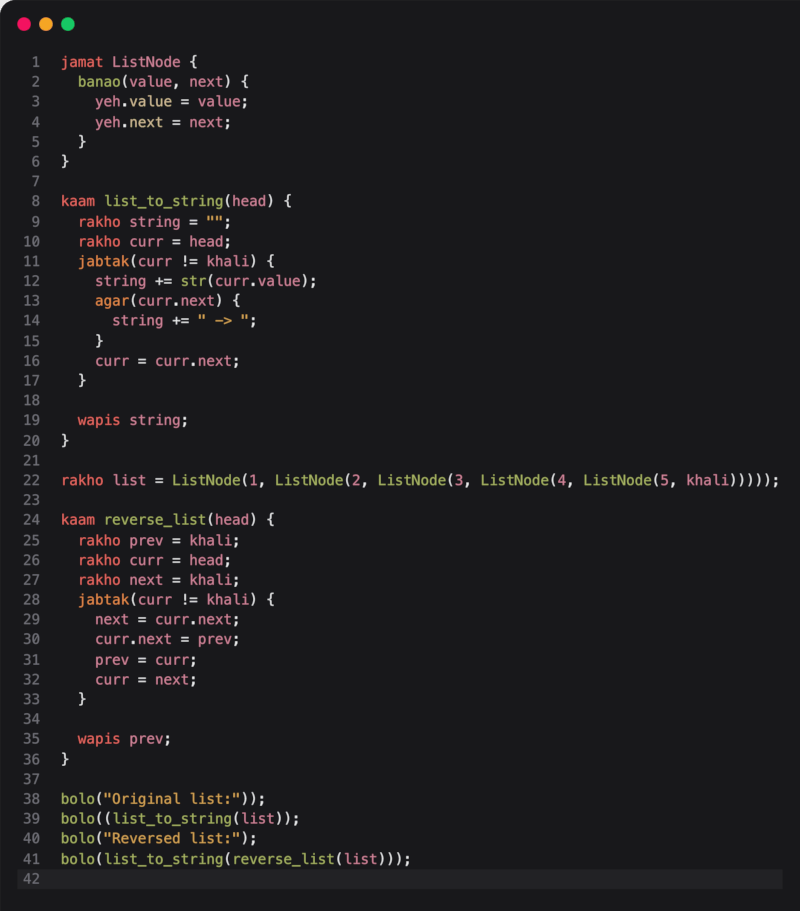
Code
jamat ListNode {
banao(value, next) {
yeh.value = value;
yeh.next = next;
}
}
kaam list_to_string(head) {
rakho string = "";
rakho curr = head;
jabtak(curr != khali) {
string += str(curr.value);
agar(curr.next) {
string += " -> ";
}
curr = curr.next;
}
wapis string;
}
rakho list = ListNode(1, ListNode(2, ListNode(3, ListNode(4, ListNode(5, khali)))));
kaam reverse_list(head) {
rakho prev = khali;
rakho curr = head;
rakho next = khali;
jabtak(curr != khali) {
next = curr.next;
curr.next = prev;
prev = curr;
curr = next;
}
wapis prev;
}
bolo("Original list:"));
bolo((list_to_string(list));
bolo("Reversed list:");
bolo(list_to_string(reverse_list(list)));
Output
Original list:
1 -> 2 -> 3 -> 4 -> 5
Reversed list:
5 -> 4 -> 3 -> 2 -> 1
More Examples
I've provided many more examples, in the examples directory. You can run them with cargo run --example <name> or by running the main.qlm file inside the examples subdirectory with qalam <file_path>.
Speed
qalam is an interpreted language with dynamic types. However, since there are essentially zero optimizations done, it is extremely slow. I am also an extreme amateur when it comes to Rust programming, therefore, it is probably even slower than Robert's implementation in Java as I definitely did a million things wrong when using Rust.
In order to showcase how slow it actually is, I'll compare it's speed to JavaScript and Python (interpreted, dynamically typed languages). For the comparison, I'll use the calculation of the 30th fibonacci number using a recursive algorithm.
Below are the scripts for each language
Python
import time
def fib(n):
if n <= 1:
return n
else:
return fib(n - 1) + fib(n - 2)
start = time.time()
result = fib(30)
end = time.time()
print(f"{end - start}")
JavaScript
function fib(n) {
if (n <= 1) {
return n;
} else {
return fib(n - 1) + fib(n - 2);
}
}
let start = Date.now() / 1000;
let result = fib(30);
let end = Date.now() / 1000;
console.log(`${end - start}`);
Qalam
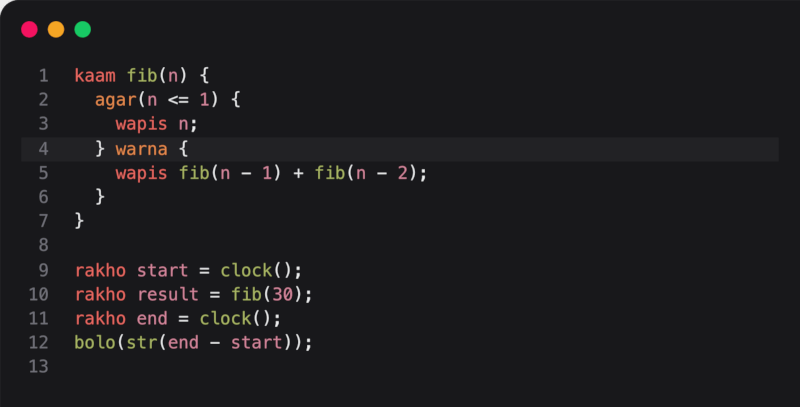
Code
kaam fib(n) {
agar(n <= 1) {
wapis n;
} warna {
wapis fib(n - 1) + fib(n - 2);
}
}
rakho start = clock();
rakho result = fib(30);
rakho end = clock();
bolo(str(end - start));
Each test was run 10 times and the average runtime is tabulated below:
| Language | Average Runtime (s) |
|---|---|
| JavaScript | 0.0185 |
| Python | 0.2238 |
| Qalam | 36.2470 |
JavaScript and Python take less than second each. Qalam takes half a minute. It is extremely slow, however, I am still proud that it works lol.
Dependencies
~6–13MB
~157K SLoC